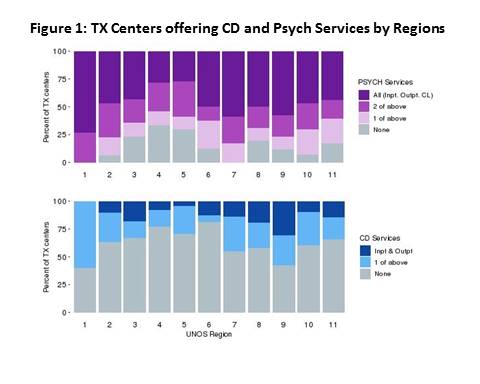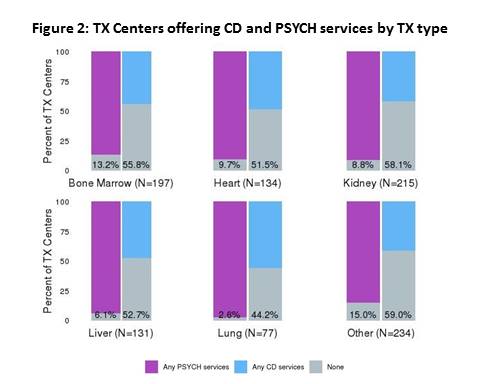Availability of Psychiatric and Chemical Dependency Treatment Services at US Hospitals Providing Transplantations
S. K. Niazi1, A. Spaulding2, T. Schneekloth3, A. Keaveny4, A. Vasquez1, E. Vargas2, T. Rummans1, C. Taner5
1Psychiatry & Psychology, Mayo Clinic, Jacksonville, FL, 2Health Services Research, Mayo Clinic, Jacksonville, FL, 3Psychiatry & Psychology, Mayo Clinic, Rochester, MN, 4Hepatology, Mayo Clinic, Jacksonville, FL, 5Transplantation, Mayo Clinic, Jacksonville, FL
Meeting: 2019 American Transplant Congress
Abstract number: D1
Keywords: Psychiatric comorbidity, Psychosocial, Public policy, Quality of life
Session Information
Session Name: Poster Session D: Quality Assurance Process Improvement & Regulatory Issues
Session Type: Poster Session
Date: Tuesday, June 4, 2019
Session Time: 6:00pm-7:00pm
 Presentation Time: 6:00pm-7:00pm
Presentation Time: 6:00pm-7:00pm
Location: Hall C & D
*Purpose: Comprehensive pre-transplant psychosocial assessment is recommended by organ-specific professional transplant (TX) organizations. Given the significant impact on TX outcomes of untreated psychiatric (PSYCH) comorbidities, pre-TX identification and ongoing treatment is critical. However, it is unknown whether adequate PSYCH resources are available at TX centers to meet these standards. The aim of this study was to assess the availability of PSYCH resources and factors associated with it.
*Methods: The 2017 American Hospital Association Annual Survey dataset provided information on U.S. hospitals providing marrow or solid organ TX. Univariate associations between hospital characteristics and presence of PSYCH and chemical dependency (CD) treatment services were examined with Chi square or Kruskal-Wallis tests. Significantly associated characteristics were further assessed with multivariate logistic regression models. Odds ratios (OR) and 95% confidence intervals (CI) are reported.
*Results: Among the 354 U.S. hospitals performing TXs, the majority were non-profit (75%), teaching hospitals (93%), part of a system (74%), and located in urban areas (96%). Overall, 57 (16%) of these TX centers offered no PSYCH services and 224 (63%) offered no CD services. There were differences across UNOS regions (Figure 1) and TX type (Figure 2). In contrast to UNOS region 1, where all TX centers offered PSYCH services and 60% provided CD services, in UNOS region 4, 33% of TX centers did not offer any PSYCH services and 77% did not offer any CD services. In region 5, 30% of TX centers did not offer PSYCH services and 71% did not offer CD services. In region 6, 81% of TX centers did not offer any CD services in multivariate analysis, TX centers were more likely to offer PSYCH services if they were teaching hospitals (OR: 3.05, 95% CI: 1.13-8.18) and of larger size (OR: 1.03, 95% CI: 1.02-1.05 per 10-bed increase). TX centers were more likely to offer CD services if they were part of a system (OR: 2.09, 95% CI: 1.13-3.86) or were larger (OR: 1.02, 95% CI: 1.01-1.03 per 10-bed increase).
*Conclusions: Availability of PSYCH and CD services varies across UNOS regions and by organ type. This can impact TX centers’ ability to perform comprehensive pre-TX psychosocial assessment and treatment. Implications for post-TX outcomes require further study.
To cite this abstract in AMA style:
Niazi SK, Spaulding A, Schneekloth T, Keaveny A, Vasquez A, Vargas E, Rummans T, Taner C. Availability of Psychiatric and Chemical Dependency Treatment Services at US Hospitals Providing Transplantations [abstract]. Am J Transplant. 2019; 19 (suppl 3). https://atcmeetingabstracts.com/abstract/availability-of-psychiatric-and-chemical-dependency-treatment-services-at-us-hospitals-providing-transplantations/. Accessed February 15, 2026.« Back to 2019 American Transplant Congress


